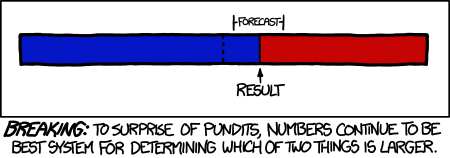Over at Less Wrong, the estimable Eliezer Yudkowsky attempts to account for the meaning of statements in arithmetic and the ontological status of numbers. I started to post a comment, but it got long enough that I’ve turned my comment into a blog post. I’ve tried to summarize my understanding of Yudkowsky’s position along the way, but of course it’s possible I’ve gotten something wrong.
It’s worth noting that every single point below is something I’ve blogged about before. At the moment I’m too lazy to insert links to all those earlier blog posts, but I might come back and put the links in later. In any event, I think this post stands alone. Because it got long, I’ve inserted section numbers for the convenience of commenters who might want to refer to particular passages.
1. Yudkowsky poses, in essence, the following question:
Main Question, My Version: In what sense is the sentence “two plus two equals four” meaningful and/or true?
Yudkowsky phrases the question a little differently. What he actually asks is:
Main Question, Original Version: In what sense is the sentence “2 + 2 = 4″ meaningful and/or true?”
This, I think, threatens to confuse the issue. It’s important to distinguish between the numeral “2”, which is a formal symbol designed to be manipulated according to formal rules, and the noun “two”, which appears to name something, namely a particular number. Because Yudkowsky is asking about meaning and truth, I presume it is the noun, and not the symbol, that he intends to mention. So I’ll stick with my version, and translate his remarks accordingly.
2. Yudkowsky provisionally offers the following answer:
Continue reading ‘Accounting for Numbers’




